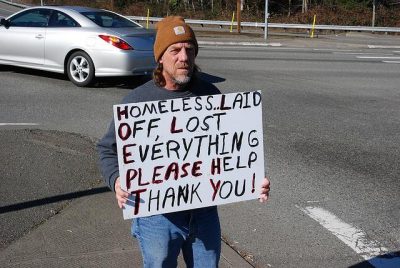Being homeless is not illegal. At least, that was before the City Council of Columbia, South Carolina voted to implement an “Emergency Homeless Response” that will give those experiencing homelessness a choice—either vacate to a designated emergency shelter, or go to prison.
The reason? According to local business owners, “the growth of economic development is being hindered, and business owners are beginning to look elsewhere to set up shop.” Rather than addressing the reasons for the increase in homelessness (48% reported this January that they were experiencing homelessness for the first time), the city will shuttle people to a building accessible only by bus, providing “immediate relief to the business community.”

AR McLin/Flickr
The new emergency shelter can only house 240 people—barely 16 percent of Columbia’s homeless population and less than 30 percent of those both homeless and unsheltered. If anyone refuses to be bussed to the shelter, police are allowed to arrest them for any number of public nuisance laws. “No person will be subject to any law in a manner that is different from any other citizen,” the Emergency Homeless Response presentation affirms. Yet local business owners need only pick up the phone to call a dedicated number when “a person in need is identified.” Allowing the police to detain anyone believed to be homeless could serve as an entry point to racial and socio-economic profiling.
The city’s report provides no measures for people willing to go to the emergency shelter after it’s full. Police officers will likely be instructed to send individuals straight to prison. The 241st person could be anyone—an elderly person with a serious medical condition, a high school student, or a single mother with young children. Out of the nearly 1,500 people surveyed by a South Carolina Point in Time Count—a single day census of those experiencing homelessness— about 80 were mothers with children and over 50 were under five years of age.
The social cost to Columbia will likely be greater than the $1.7 million allotted to the Emergency Response. A single incarceration could cost $50 per day and would be detrimental to a person’s ability to find a job or an apartment. Removing a person’s opportunity to earn an income limits Columbia’s ability to grow as a city, even if some of its businesses expand. The emergency policy and a 240-person shelter outside the city won’t be effective in revitalizing Columbia’s economy, but merely move the issues out of sight. After March, the emergency shelter will be sold for private development, and any replacement won’t be allowed in the downtown business district.
By contrast, Connecticut passed the “Homeless Person’s Bill of Rights” this June, which protects basic rights such as safety from harassment, nondiscrimination in housing and employment, and the right to vote. If Governor Malloy signs the bill, Connecticut would be the third state to protect the homeless from discrimination, following Rhode Island and Illinois.
